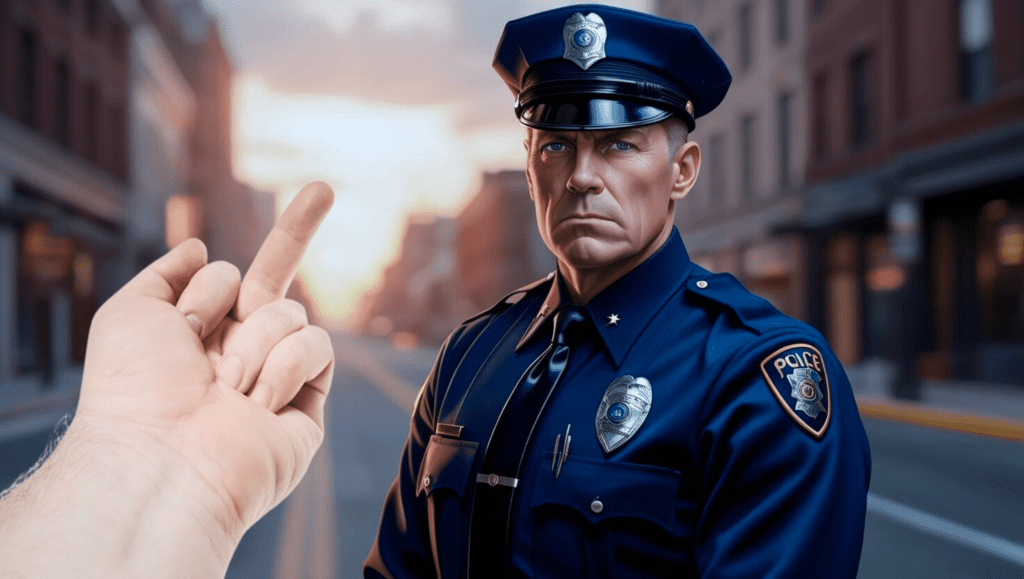So you’d like to gift a cop a nice view of the knuckles of one of your fingers.
- Is that legal?
- Can you get arrested for it?
- Can you get pulled over and questioned about it?
Yes. Yes. and Yes.

What Happens If I Flip Off The Police?
Well either they’re going to ignore it or they’re going to confront you. If you’re concerned about the latter happening, then don’t even start this journey. If you’re under the impression that giving the finger to the police is legal, and that fact means they cannot detain you for it – then you better buckle up for some consequences. Regardless of the legality of it, police are human and are free to ignore law and amendments because their feelings are hurt. Is it worth it to potentially get detained, questioned, arrested, and given a court date so you can express your first amendment rights? It is? Hell yeah, brother.
That being said, read below for some more information on the topic of giving the police the middle finger and the potential consequences.
Is Giving a Cop The Finger Protected by the First Amendment?
I’m sure you’ve seen videos at this point of First Amendment Auditors or potentially just everyday people unhappy with their local authorities that decide to record themselves giving the bird to the boys in blue. If there’s a video of it, chances are the cop didn’t just ignore it. Chances are the video is showing the officer come and investigate the egregious crime. Isn’t it first amendment protected activity though? It’s quite literally an act of expression after all.
Yes it’s protected. Well, not all the time. It depends what else you’re doing… and who is around… and how they react. So yes, but not always.
Usually yes it is protected, but as always – it depends. It’s pretty much entirely context-dependent. Did your action cause a riot or group of people to become unruly? Did you do it in the middle of an already ongoing confrontation with said officer in an effort to escalate things? Were you screaming obscenities across the street at an officer while you were doing it? Well, these are some situations that would take the flipping off action to a different level. Basically in isolation with all else being calm, your desire to express yourself via finger should be protected. Driving by and doing it while passing some police officers is protected, but that doesn’t mean you’re immune from being retaliated against for it.

A through line with a lot of this is going to be that regardless of if it’s legal, you very likely will still experience consequences. If you’re in the mood to argue and love confrontation, you may have found yourself a great new hobby.
Can You Get Arrested For Giving a Cop the Bird?
As stated above, many situations would find this action legal. Some situations would cause this action to be illegal. At the end of the day, you can still be arrested regardless of the legality. You’ll have to then hire a lawyer to prove all of it then.
Yes, you certainly can be arrested, even if you did it 100% legally. Now, you might be thinking you can explain your way out of it, and you very well could. You can dismiss their allegations and continue to tell them the facts of the situation, the fact it’s protected, and that there are no elements of disorderly conduct involved. That may get you off, and we’ve all seen the videos where that method has worked. We’ve also seen many cases where it doesn’t and an arrest is made for disorderly conduct (even if there was none).
Well, what now?
Can I Sue If I Was Wrongfully Detained?
There are a few things to consider on this. Let’s talk about the detainment first. Let’s say you’re out there stress testing the First Amendment by flipping off a cop. He or she comes up to you and ask you what the problem is. You ask if you’re being detained. They say yes. Great. You’ve been detained for the action. Can you sue at this point?
What damages occurred that you could sue for?
- Emotional distress
- Humiliation
- Loss of time
- Punitive damages in some cases
These damages are based on the claims of violating your First and Fourth Amendment rights.
The Fourth Amendment deals with searches and seizures. Being detained unlawfully is a seizure of your person temporarily due to you not being able to freely leave the situation.
Now let’s go back to the hypothetical and assume you were detained for a two minute conversation where you explained what you were doing and then were let go. It would be hard to argue that two minutes of your time had substantial monetary value when you were out meandering just flipping people off.
Emotional distress could be argued, but again, the detainment could be considered justified if the officer accepted at face value what was going on and let you go ASAP.
Punitive damages would be tough to argue as well for a short detainment.
Humiliation also would be harder to argue the shorter the detainment is.
Let’s say it was a half hour detainment, there were threats of arrest, and it was in front of a group of people in a busy shopping area. Now we’re getting into loss of time, humiliation, and emotional distress. Again, this would be very situation-dependent, but a good rule of thumb is the longer the detainment and more aggressive the tone of the detainment, the more likely you are to have your legal claims and damages affirmed.
What if the Detainment Turned Into an Actual Arrest? Can I Sue Then?
This is where there’s a lot more meat on the finger bone.

Now, if you were being disorderly and causing a general disturbance while flipping off the police, the arrest very well could be justified and your lawsuit might not have legs… or fingers.
If the detainment and arrest were 100% unjustifiable, then your lawsuit would certainly increase in chances of success in your favor. In this situation, you would be looking at 42 U.S.C.§ 1983 – Civil Action for Deprivation of Rights. Basically if a government agent subjects a citizen to deprivation of rights, privileges or immunities then that person shall be liable to the deprived citizen. Normally you cannot sue government officials due to qualified immunity but if your rights are violated, it opens up the lawsuit ability.
Institute for Justice deals a lot with these cases.
Why Do The Police Get So Mad About It?
Ah, the age-old question—why does a simple finger gesture make some cops lose their minds? After all, aren’t they supposed to be professionals who enforce laws, not feelings? Well, in theory, yes. But in practice? Not so much.
Here’s why some officers react as if you just insulted their entire family lineage:
1. Ego and Authority Complex
Some officers view any sign of disrespect as a direct challenge to their authority. They’re used to people obeying their commands, so when someone flips them off, it feels like a power struggle—and they don’t like losing.
2. The “Contempt of Cop” Syndrome
There’s no official law against hurting an officer’s feelings, but that doesn’t stop some from acting like there is. This is known as “Contempt of Cop”—when police take personal offense to something and decide to punish you for it, even if you haven’t actually broken a law.
3. Thin-Skinned, But Armed
Some officers take the job for the right reasons—to protect and serve. Others? Not so much. The wrong kind of person with a badge is going to see a middle finger as a personal attack rather than what it actually is—a meaningless, non-threatening gesture.
4. They Know They Can Get Away With Retaliation
Let’s be real—most people don’t want to deal with the legal nightmare of suing a cop or spending a night in jail just to make a point. Some officers use this to their advantage, knowing that even if they’re in the wrong, they can still detain, ticket, or hassle you with little consequence.
5. Some Officers Are Just Having a Bad Day
Cops are human (despite what some of them might believe). If they’ve already had a stressful shift, the last thing they want is some random civilian reminding them that they’re not universally loved. The middle finger might be the final straw that makes them snap.

So, Should You Do It Anyway?
That’s up to you. Don’t ask me. But. No. What do you have to gain? What do you have to lose? I would argue the value of what’s to gain is peanuts compared to what you have to lose.


